Hampden roars for Glasgow 2014
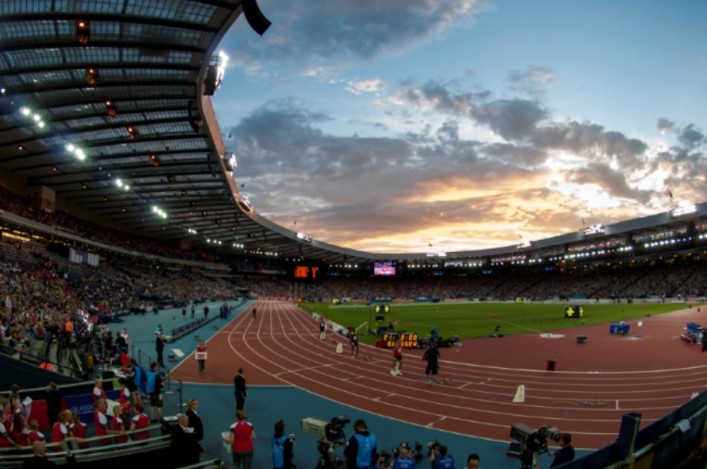
Perfect stage . . . Hampden Park proved the ideal venue for the track and field at Glasgow 2014 (photo by Bobby Gavin)
By Arnold Black, scottishathletics Historian
The Commonwealth Games came to Scotland for the third time in 2014.
The venue this time was Glasgow’s re-vamped Hampden Park, a location that had been a traditional home for Scottish athletics championships in the past.
Six years on, the memories flood back. The walk up Prospecthill Road, the queues to get in, the Proclaimers’ 500 Miles blasting out, the Kiss-Cam and, yes, the athletics.
Day one saw one of the main events away from the track, the women’s marathon. Three Scots in the field, including Hayley Haining, at 42 years and 143 days, the oldest athlete to represent Scotland at any Commonwealth Games.
Susan Partridge was the leading Scot, staying at the front for 15 kilometres before finishing sixth in a new Scottish native record of 2:32:18. The race saw a Kenyan victory as did the first track final of the Games, the men’s 5000 metres, both though falling short of the existing Scottish all-comers’ records.
Day two and the night belonged to one person, Libby Clegg who stormed to victory in the T12 100 metres in a world-leading 12.20 seconds. She had always been a favourite but turning it into gold is another matter. We need not have worried.
A winning margin of 1.13 seconds is impressive in any sprint and she completely dominated the event, thoroughly deserving of the ovation she got and the heart-felt rendering of Flower of Scotland.
The famous Hampden Roar happens at the right moment – and it happened this Monday evening for Libby Clegg and her guide Mikail Huggins.
It was Scotland’s first gold medal in athletics since Yvonne Murray won the 10,000m in Victoria in 1994.
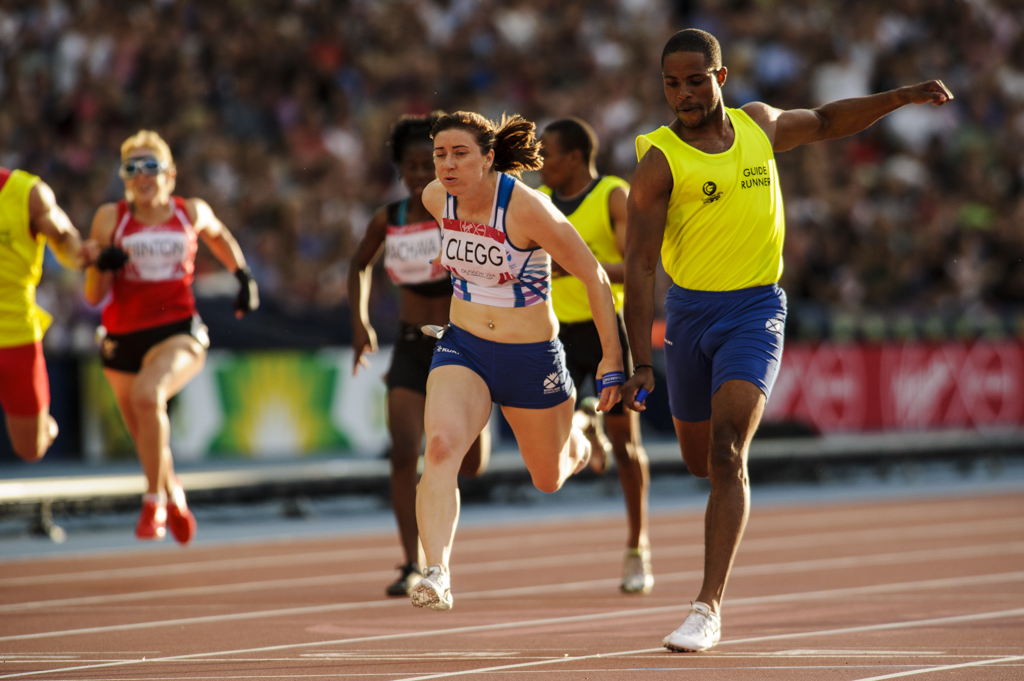 Libby and Mikail dip for the line to win gold at Hampden
Libby and Mikail dip for the line to win gold at Hampden
The women’s hammer final saw a little bit of Games history created – the first time that three Scots have ever appeared in the final of a women’s throwing event.
Susan McKelvie topped the home battle with 63.76m, a throw that saw her place sixth. The title itself was won by the supreme Sultana Frizell of Canada with her throw of 71.97m a Games record and a Scottish all-comers’ record, removing Kuzenkova’s 71.73 (2002) from the record books. There was a compelling Shot competition of high standard with O’Dayne Richards of Jamaica defeating New Zealand’s Tom Walsh 21.61 to 21.19.
There were two outstanding 100m finals sandwiching the medal ceremony for Libby Clegg, with fine wins for Kemar Bailey-Cole (Jamaica) in 10.00 and Nigeria’s Blessing Okagbare in 10.85. That followed Okagbare’s semi-final win in 10.93, the first time we have seen a sub-11 second clocking in Scotland for the women’s 100.
Day three. It had been 20 years since Geoff Parsons became the last Scottish man to win a medal in any field event and 32 years since Chris Black took hammer bronze. Today they were emulated by Mark Dry who took third place in the hammer with a throw of 71.64m.
On the track, the Scottish highlight was Beth Potter‘s courageous run in the 10000 metres and the pleasure, for a short time at least, of seeing a Scot lead the Kenyans and Ugandans who traditionally dominate the event.
For four minutes she led the race before the Kenyans made their decisive break and it was then a battle between them for the medals, won by Chepkirui in 32:09.35 but there was still a lovely battle between Potter and England’s Kate Avery for fourth.
Beth looked to have secured it going up the final home straight but Kate came back and just took fourth on the line by the smallest of margins.
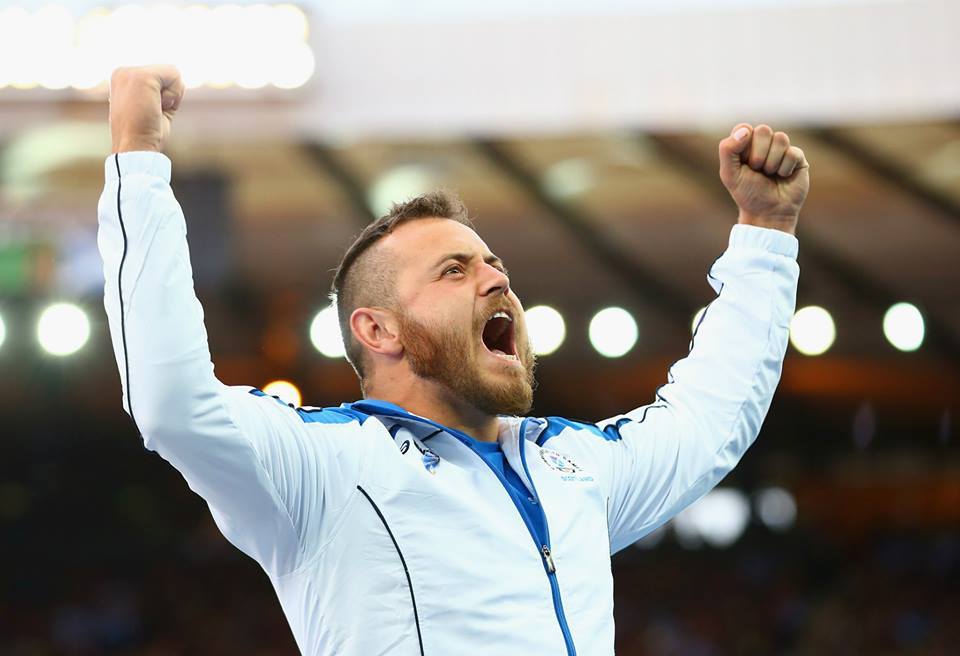 Mark Dry celebrates bronze in the hammer
Mark Dry celebrates bronze in the hammer
There was disappointment, though, for Laura Muir. As the athletes came around the final bend of the 1500m, Laura appeared to lose her balance and in the effort to stay on her feet, totally lost her momentum. Disheartened, she came home 11th in 4:14.21, the race won by Kenya’s Faith Kipyegon in 4:08.94.
The following day showed how tough a competition these Games can be with high standards in the qualifying in the field and quality finals. Angus McInroy produced the first track and field Scottish native record of the Games, 57.28m in the third round of the discus qualifying, for 11th position in the final, and Eilish McColgan improved her own native record by 0.04 seconds in the Steeplechase to claim sixth place.
Kirsty Yates, only recently turned 21, and competing alongside the great Valerie Adams – both of them sharing the honour of being former Scottish under-15 champions – was certainly not overawed by the occasion as she fired her first round shot putt to a new personal best of 16.42m and temporarily led the leaderboard, finally placing 8th.
These Games were proving compelling viewing but one thing the organisers got wrong was the scheduling of medal ceremonies after the final event.
It was disappointing to see Valerie Adams, javelin winner Kim Mickle (her 65.96 being a Games record and Scottish all-comers’ record) and Canadian Derek Drouin (another all-comers’ record of 2.31m in the high jump) being presented their medals after 10pm in a half-empty stadium. They deserved better.
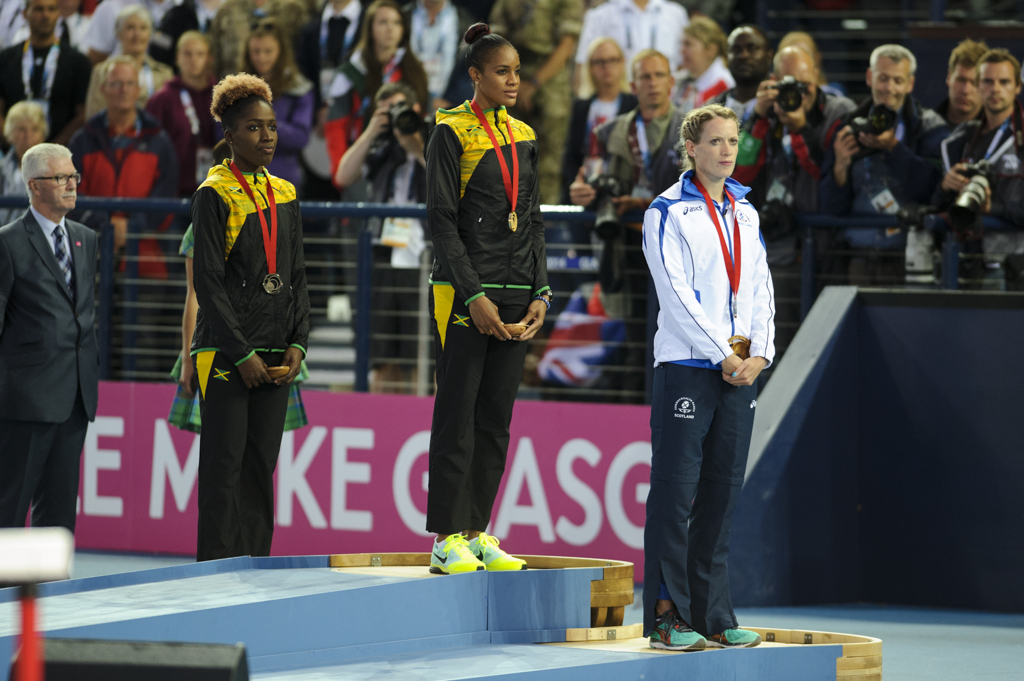 Medal moment on the podium at Hampden for Eilidh Child
Medal moment on the podium at Hampden for Eilidh Child
As we hit the last day of July, Eilidh Child set Scottish hearts alight as she withstood all the pressure of expectation to win the silver medal in the 400 metres hurdles.
Her performance gave Scotland a complete set of medals – one gold, one silver, and one bronze – at these Games, the first time that has been achieved since 1990.
And it earned Eilidh her second silver medal, following the one she gained four years earlier in Delhi. Any tension at the start was enhanced when, just as in her heat, the start was delayed. This time it was because there was a crash in the silence when the two remote-controlled cars that carried the discuses back from the field crashed into each other!
Child started well, as did the favourite Kaliese Spencer of Jamaica, but as they entered the home straight, Spencer, the world number one with 53.41, had moved ahead with Eilidh clear in second. So it remained to the line as Spencer pulled clear to win in 54.10, an outstanding time in the cool, wet conditions, and a new Scottish all-comers’ record surpassing Eilidh’s own mark of 54.39.
Eilidh took the silver in 55.02; the Proclaimers’ 500 Miles blared out all round the stadium on her lap of honour, although I’m not sure a Hearts fan would have wanted to hear a song by two Hibs-supporting brothers!
Guy Learmonth lined up in the 800m final, his third race alongside the great David Rudisha in three days. On paper, Guy was the slowest in the field by some margin, 1.35 seconds behind the 8th fastest, but he ran a committed race.
At the bell, he was seventh as Rudisha led the field in 52.71. He dropped to the back but refused to accept that fate and came back strongly in the home straight to pick off three athletes and finish in a personal best of 1:46.69 for sixth position. These had been an outstanding Games for Learmonth.
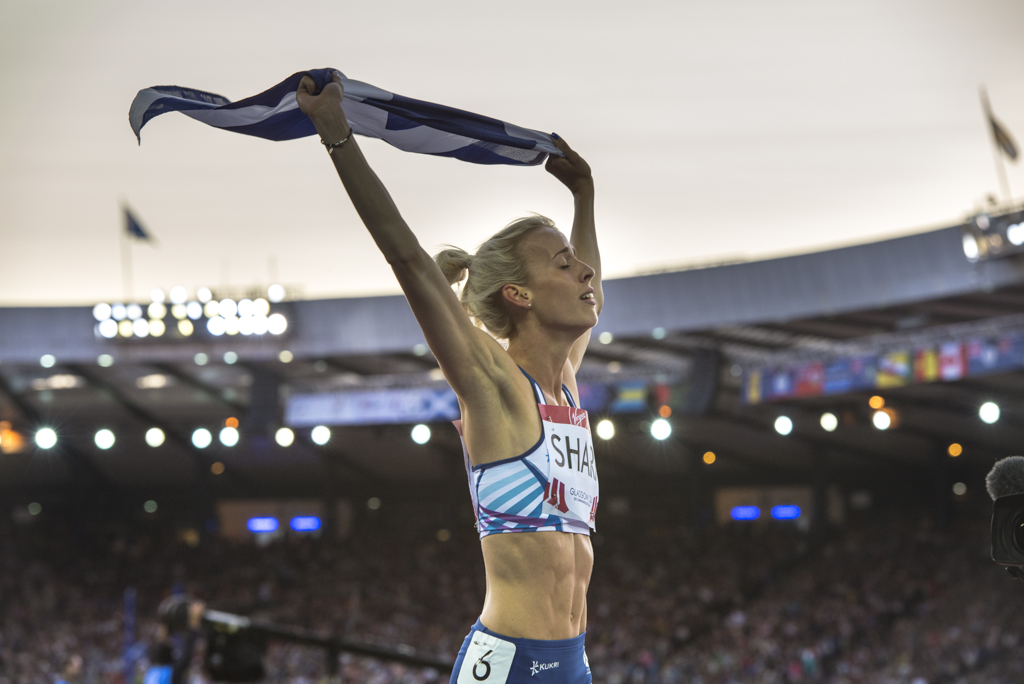 Bobby Gavin’s superb photo has become one of the iconic Glasgow 2014 images as Lynsey Sharp celebrates
Bobby Gavin’s superb photo has become one of the iconic Glasgow 2014 images as Lynsey Sharp celebrates
August 1. There was only going to be one outcome. For an athlete who has had to overcome injury, who at one stage was potentially missing the Games as she underwent surgery, who was sick and on a drip overnight, and who only qualified for the final as a fastest loser, the words “Get out strong. Commit.” written on her hand were unnecessary. This was as committed a performance as you will see.
Lynsey Sharp went out strong from the start as the world champion Eunice Sum led the field through at a fast pace. As they rounded the bend for the final time at the start of the home straight, Sum led from Nanyondo, Judd and Meadows.
Sharp made one last committed effort, moving faster on the outside of Meadows, past Judd and then fighting all the way to the line. Eyes closed, she caught Nanyondo at the tape, winning the silver medal in 2:01.34.
The crowd went wild. There was a recognition in these Games that we were in the presence of great athletes from around the world. No medal was easy and every one was richly deserved. Lynsey’s silver brought Scotland’s medal tally to four, bettering the performance at each of the previous five Games.
For the Sharp family, her silver medal complemented father Cameron’s relay gold in 1978 and his three bronze medals from 1978 and 1982.
There is a very tight margin between success and fourth place. In the case of pole vaulter Jax Thoirs, it was his one failed clearance at 5.45m that saw him miss out on a bronze medal to the Canadian Shawnacy Barber.
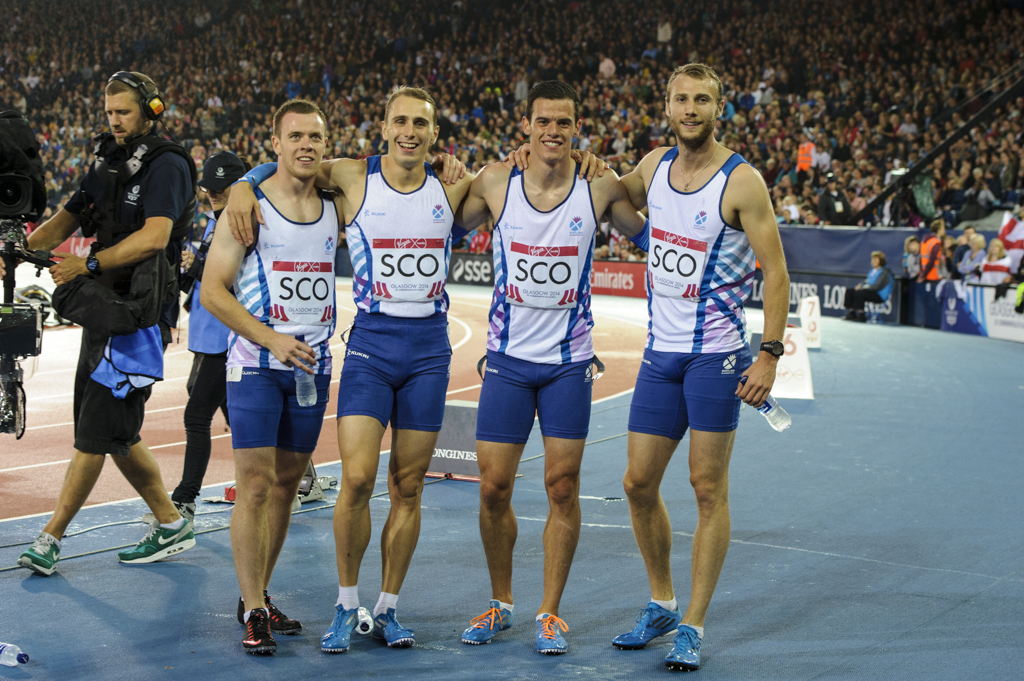 National Record holders – the men’s 4x400m quartet
National Record holders – the men’s 4x400m quartet
We may not have had an individual runner in the 400m but the focus solely on the 4 x 40m relay benefited the Scottish team of Kris Robertson, Jamie Bowie, Greg Louden and Grant Plenderleith.
This was the first time in the history of these Games that Scotland have entered a team of four natural 400m runners, rather than adapting from other team members.
It was also the first time since 1990 that Scotland had entered a team in this relay. On that occasion, a makeshift quartet came away with the silver medal in a national record of 3:04.68.
That time still stood as the record until tonight when the Scottish quartet produced the run of their lives to come home third in the heat behind England and Jamaica in a new record run of 3:03.94 to qualify for the final.
The last day. It’s all over. The Commonwealth Games ended with Usain Bolt after some more fine performances by Scottish athletes. Chris O’Hare produced the best performance by a Scot in the showpiece 1500m final since Graham Williamson placed fourth in 1982.
It was sixth place, too, for Laura Whittle in the women’s 5000m. After a slow start, running at the back of the field of 17 athletes, she seemed to grow in confidence as the race progressed, picking off backmarkers and then as athletes wilted in front of her, she finished stronger than most of them.
The heavy rain played havoc with the women’s pole vault. 60 percent of the field was wiped out without clearing a height. The hazards of competing in a Scottish summer.
But these Games rose to the occasion. The full houses provided a great atmosphere with memorable moments. None more so, than the F42/44 Men’s Discus and the amazing achievement of Nigeria’s Richard Okigbazi, not using a prosthetic leg and winning the bronze medal with 39.38 metres while balancing on a single leg.
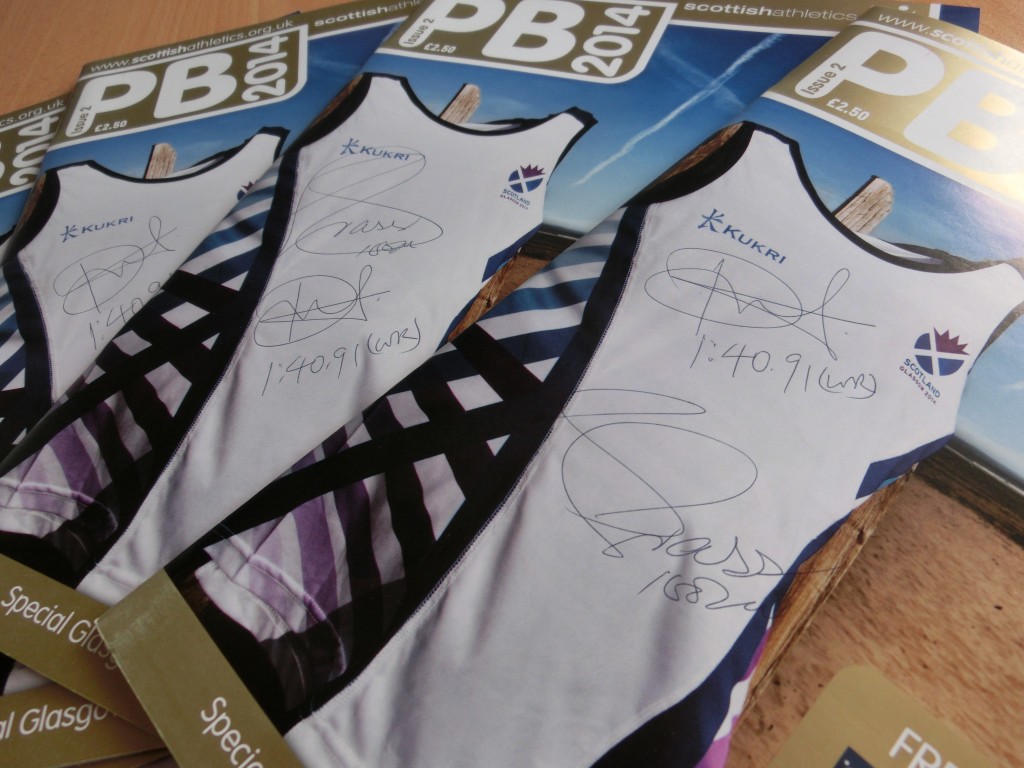 Our PB preview edition for the Glasgow 2014 Games – signed by David Rudisha !!
Our PB preview edition for the Glasgow 2014 Games – signed by David Rudisha !!
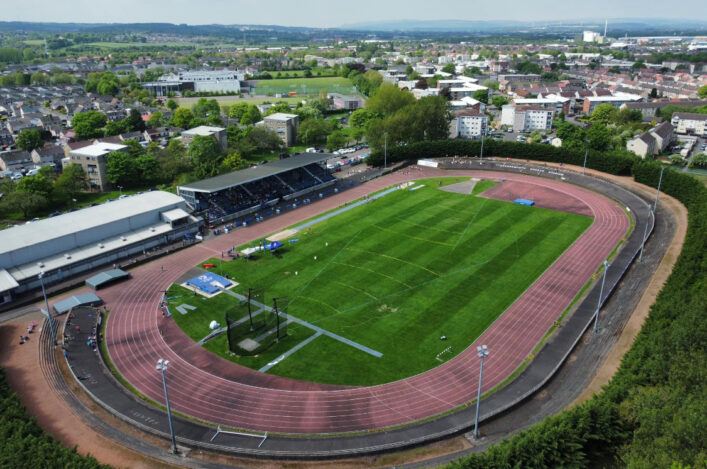
Latest Facebook update
5 hours ago
Photo
Share on Facebook Share on Twitter Share on Linked In Share by Email